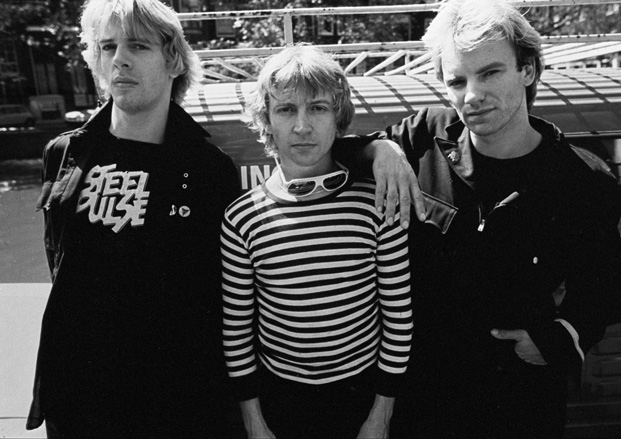Andy Summers' Top 10 Guitar Moments with The Police

As a result of their world-conquering commercial success, it's easy to consider the Police—Sting,Andy Summers and Stewart Copeland—mere "hit makers."
But stopping there would undermine a truly phenomenal—and musically progressive—body of work by an undeniably talented trio of musicians and songwriters.
Though Sting's dark, brooding songwriting seemed to dominate the band, equally crucial were the musical contributions of Summers, the band's soft-spoken by hard-edged guitarist. Summers' easily identifiable playing, influenced by everything from reggae to classical music, built the bridge between Sting's steady bass lines and Copeland's busy, virtuosic percussion work.
In celebration of Can't Stand Losing You: Surviving the Police, Summers' new documentary about his time with the band—and Metal Dog, his new instrumental album, we've decided to collect what we consider Summers' top 10 guitar moments with the Police.
And if you haven't heard it, be sure to sample Certifiable: Live in Buenos Aires, the band's 2008 live album, which captures these three musicians—not to mention Summers' biting guitar sound—at their peak. Several videos below are from the band's massive 2007/2008 tour.
To keep up with Summers—who's been busy of late—visit andysummers.com. Enjoy!
"Message in a Bottle"Reggatta de Blanc (1979)
Get The Pick Newsletter
All the latest guitar news, interviews, lessons, reviews, deals and more, direct to your inbox!
Unquestionably one of the band's most unforgettable tunes, Summers shines here. His opening riff, and the gorgeous arpeggios he unleashes at the end of the chorus are enough to make you feel happily lost on an island.
"So Lonely"Outlandos d'Amour (1978)
Although overshadowed by the the Police's first-album hits "Can't Stand Losing You" and "Roxanne," "So Lonely" has persevered as a classic fan-favorite. Summer's playing on this tune—a joyful explosion of pop songwriting—is loose and nimble, providing the song with flexibility and excitement.
"Roxanne"Outlandos d'Amour (1978)
The song that began the Police's brief but astoundingly successful run might be more famous for Sting's vivid portrait of its titular character, but without Summers' simple, easygoing but effortlessly cool riffing, it's unlikely that it would have become the gargantuan, career-launching hit it turned into. It's also a great song to sing if you ever happen to get on an elevator with Sting.
"When the World Is Running Down, You Make the Best of What's Still Around"Zenyatta Mondatta (1980)
Though this track offers more than a touch of bass-heavy disco, Summers' fretwork still defines the atmosphere. He embraces a philosophy of "less is more," almost answering Sting's vocals and thick bass lines with clean, echoing chords. The fast double-picking he engages in toward the song's finale adds tension to an otherwise pristine, soothing pop gem.
"Synchronicity II"Synchronicity (1983)
Almost as if responding to the dark story Sting lays out for this song, Summers' riffing on "Synchronicity II" sounds almost impatient. Eschewing his normally clean tone, Summers embraces something close to distortion, creating angular melodic lines that seemingly want to break down the walls of the troubled family home Sting discusses in the lyrics.
"Next to You"Outlandos d'Amour (1978)
Though the Police were originally inspired by London's punk movement, the music they ended up creating bore little resemblance to the aggressive, politically charged music that scene created. That is, except for "Next to You." Summers' tightly coiled riffing works beautifully in tandem with Sting's frustrated, romantic laments.
"Bring on the Night"Reggatta de Blanc (1979)
For "Bring on the Night," Summers incorporates numerous distinct flavors into his playing. While his upstrokes in the chorus are pure reggae, the angular series of notes he unleashes in the verses recall prog-rock masters like Robert Fripp of King Crimson. While not the most unforgettable of the band's hits, this track is really a showcase for Summers' amazing versatility.
"Can't Stand Losing You"Outlandos d'Amour (1978)
Coming as it does from the band's debut, 1978's Outlandos d'Amour, "Can't Stand Losing You" has the obvious reggae influence Summers, Sting and Copeland frequently displayed in their early days. But Summers' upstrokes are never sunny; they have enough spunk and edge to match Sting's words of desperation blow for blow.
"Driven to Tears"Zenyatta Mondatta (1980)
This is another track on which Summers completely controls the atmosphere. Though the song could almost be a James Bond theme in the verses, the clean, cathartic chords Summers throws down in the chorus are pure bliss.
"Every Breath You Take"Synchronicity (1983)
A creepy slow-burner that became the band's final, monumental hit, "Every Breath You Take" is one of Summers' greatest contributions to not only the Police, but to Eighties rock. Inspired by Hungarian composer Béla Bártok, Summers crafted an iconic, oft-sampled riff that perfectly balanced the tender and sinister qualities of the song.
Jackson is an Associate Editor at GuitarWorld.com. He’s been writing and editing stories about new gear, technique and guitar-driven music both old and new since 2014, and has also written extensively on the same topics for Guitar Player. Elsewhere, his album reviews and essays have appeared in Louder and Unrecorded. Though open to music of all kinds, his greatest love has always been indie, and everything that falls under its massive umbrella. To that end, you can find him on Twitter crowing about whatever great new guitar band you need to drop everything to hear right now.
“I’d always seen the guitar as a thing for really accomplished people like Jimi Hendrix – watching Nirvana on MTV Unplugged exploded my brain”: Studio nerd Corinne Bailey Rae broke through after moving on from her punk roots. Then she went back
“Elton said, ‘I'd better buy that guitar just to have in my house.’ I played it and said, ‘Yeah, you'd better buy it, so I can play it when I come by’”: One of Davey Johnstone's favorite guitars was once a piece of upscale decor for his superstar bandmate










